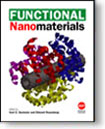|

 
|
|
Functional Nanomaterials
| |
|

|
Edited by
Kurt E. Geckeler, Gwangju Institute of
Science and Technology, South Korea
Edward Rosenberg,
University of Montana, USA |
| |
|
October
2005
500 pages, Hardcover
ISBN: 1-58883-067-5
US$399.00
|
|
 |
DESCRIPTION |
| Functional
Nanomaterials is the first and unique compilation of the
state-of-the-art review chapters covering all aspects of functional
nanomaterials and their applications. Nanotechnology has led to a
profound paradigm shift after the developments in recent years and
after being classified as one of the most important areas of
impending technology by the U.S. government. Novel functional
nanomaterials are the basis of newly emerging nanotechnologies for
various device applications. This book with 30 chapters reflects the
tremendous world-wide interest in functional nanostructured materials.
The wide variety of topics covered in this book is interesting for
professionals working in the fundamental and applied research. The
book covers major classes of nanomaterials such as carbon nanotubes,
carbon and polymer nanofibers, nanoparticles,
nanocomposites, nanosheets, fullerenes, supramolecular and
self-assembled nanostructures, and many other types of
nanomaterials. In addition, this book highlights various
physico-chemical properties of different nanostructures such as
catalytic, dielectric, magnetic, fluorescent and luminescent
properties as well as applications of nanomaterials in sensors,
photonics, drug delivery, proteomics, biomolecular electronics, and
Homeland Security. |
| CONTENTS |
- Molecular Machines for Protein
Degradation, M. Groll, M. Bochtler, H. Brandstetter, T.
Clausen, and R. Huber
- Science and Engineering of Polymer
Nanofibers, S. Ramakrishna, K. Fujihara, V. K. Ganesh, W. E.
Teo, and T. C. Lim
- Structure and Properties of Carbon
Nanotube-Based Films and Fibers, G.-W. Lee and S. Kumar
- Syntheses of Carbon Nanofibers and
Nanotubes by Catalytic Decomposition of Hydrocarbons on
Supported-Ni Catalysts, K. Otsuka and S. Takenaka
- Functionalization of Carbon Nanotubes,
D. Nepal and K. E. Geckeler
- Calculations on Solvents and Co?solvents
of Carbon Nanotubes: Cyclopyranoses, F. Torrens
- Nanostructured Materials with Enhanced
Magnetic and Catalytic Properties, L.-J. Wan and C.-L. Bai
- Nanophotonic Ensembles for Biomedical
and Homeland Security Applications, C. W. Spangler, F. Meng,
A. Gong, M. Drobizhev, A. Rebane, A. Karotki, B. D. Spangler, Z.
Suo, and E. S. Tarter
- Fullerene-Based Nanostructures, Y.
Wang and K. E. Geckeler
- Nanostructured Polyimide Materials with
Controllable Dielectric Property, B.-K. Zhu, S.-H. Xie,
Y.-Y. Xu, and Z.-K. Xu
- Arrangement of Polymer Nanoparticles on
Micro- and Nano-fabricated Silicon Substrates, M. Tanaka and
H. Nishide
- Fluorescent Organic Nanoparticles with
Strongly Enhanced Emission, B.-K. An and S. Y. Park
- Luminescent Nanomaterials, A. Roy
- Nanosized Optical "Devices"
for Applications in Proteomics and Biomolecular Electronics:
Engineered Green Fluorescent Proteins, R. Bizzarri, R.
Nifosi, P. Pingue, V. Tozzini, and F. Beltram
- Composites with Nanomaterials, L. M.
Manocha
- Libraries of Nanosized, Polyfunctional
Platforms and Nanocomposites from Silsesquioxanes, R. M.
Laine, C. Brick, M. Roll, S. Sulaiman, S. G. Kim, M. Asuncion,
J. Choi, and R. Tamaki
- Ultrafast Photoinduced Interfacial
Electron Transfer Dynamics in Molecule-Inorganic Semiconductor
Nanocomposites, X. Ai and T. Lian
- Physical Properties of Nano-Manganites
and Carbon Nanotubes, A. K. Dhami
- Nanospintronic Devices: Magnetic
Semiconductors Digital Alloys and Heusler/Semiconductor
Interfaces as New Materials, A. Continenza and and S.
Picozzi
- Supramolecular Assembly of Rod-Coil
Block Molecules into Organized Nanostructures, M. Lee and
J.-H. Ryu
- Photofunctional Supramolecular Systems
Based on Polymer Nano-sheet, T. Miyashita, J. Matsui, and M.
Mitsuishi
- Fine-Tuning Self-Assembly for Synthesis
and Structure-Property Optimization of Functional Nanomaterials,
S. Valiyaveetti
- Nanoencapsulation of Fullerene with the
Hosts Cyclodextrin and Cucurbituril, F. Constabel and K. E.
Geckeler
- Morphological Chameleons: pH-Dependent
Aggregation Behavior of Sugar-Based Gemini Amphiphiles in
Aqueous Solutions, M. Johnsson and J.B.F.N. Engberts
- Iontophoretic Drug Delivery Using
Polymer Electrolyte Materials, F. O. V. da Cunha, M. M. C.
Forte, A. Barnes, R. J. Latham, R. G. Linford, and W. S.
Schlindwein
- Pyrazolyl Embrace as a Supramolecular
Synthon: Case Study of Metal Carbonyl Complexes Containing
Linked Tris(pyrazolyl)methane Ligands, D. L. Reger, R. F.
Semeniuc, J. R. Gardinier, K. J. Brown, and M. D. Smith
- Self-Organisation of Block Copolymers
Based on Polysilanes, R. G. Jones and S. J. Holder
- Modulation of the Superstructure and
Response of Macromolecules Through Molecular Interactions and
Nanodispersion, F. Ciardelli, O. Pieroni, S. Bronco, C.
Cappelli, G. Ruggeri, and A. Pucci
- Crystallization of Nanostructures by
Plasma Enhanced Chemical Vapor Deposition, J. Zhang, P.
Yang, L. Yang, L. Xia, and Y. Guo
- Nanostructured Tin Dioxide Materials for
Gas Sensor Applications, T. A. Miller, S. D. Bakrania, C.
Perez, and M. S. Wooldridge
|
| READERSHIP |
|
This book is a valuable reference source for
scientists, graduate students, postdoctoral fellows, engineers,
industrial researchers, and other professionals working in the
fields of nanomaterials, nanotechnology, materials science,
chemistry, physics, polymer science, engineering, and biosciences.
It is a cutting-edge monograph and an essential addition to all
modern and up-to-date libraries.
|
Terms and Conditions
Privacy Policy Copyright
© 2000-
American Scientific Publishers. All Rights Reserved.
|
